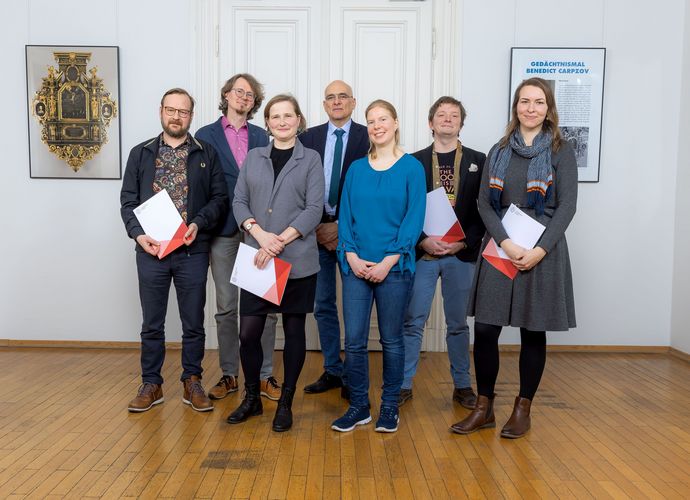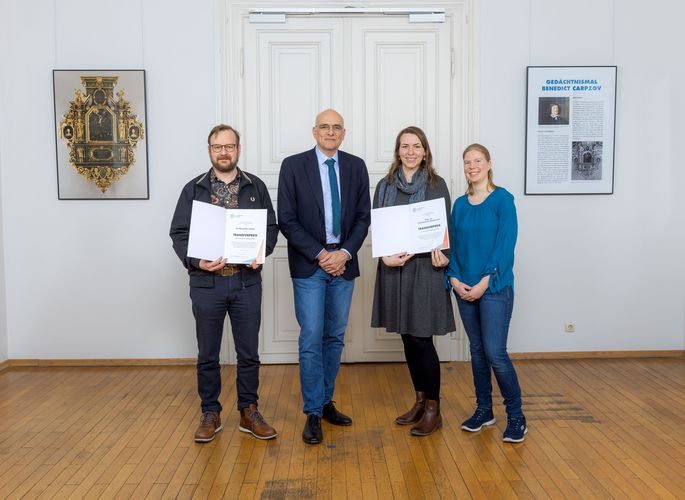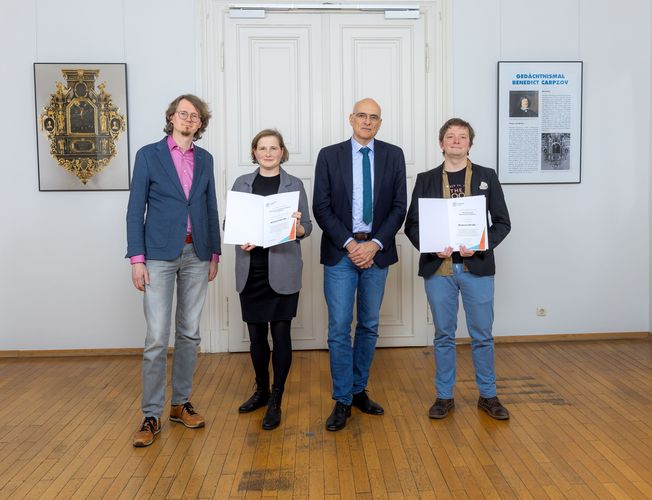During the award ceremony on Monday (27 January) at Leipzig University, the winners and funding recipients presented their projects to the Vice-Rector for Excellence Development: Research and Transfer, Professor Jens-Karl Eilers. Both the transfer prizes and the “Science meets…” funding programme are endowed with a total of 15,000 euros.
Due to the many excellent nominations for the prize and project applications for funding, the jury decided to award and support two researchers or teams in each case. As a result, they will share the prize money and funding, with each receiving 7,500 euros. This funding must be used for knowledge and technology transfer.
“The projects we are supporting and recognising make an important contribution to Leipzig University’s sense of social responsibility, and they would not be possible without the outstanding commitment of our researchers,” says Vice-Rector Eilers, commenting on the jury’s decision.
Research on the contested legacy of 1989
Dr Alexander Leistner leads two subprojects within the BMBF research network The Contested Legacy of 1989 at the Institute for the Study of Culture. Since last year, he has also been heading the project “Überlandschreiberinnen – Ways across the Country,” funded by the Volkswagen Foundation. In his research into the political shifts in eastern Germany’s political culture and the resulting challenges to a democratically structured society, the idea of knowledge transfer plays a key role, as Vice-Rector Eilers pointed out. For example, Alexander Leistner and his team developed the practice workshop format for the Legacy of 1989 research network; the workshops have for many years provided a platform for bi-annual exchange with a core group of educators focused on out-of-school history education, fostering professional development in their field.
The members of the Translating Soil Biodiversity team from the German Centre for Integrative Biodiversity Research Halle-Jena-Leipzig (iDiv) were honoured for their commitment to co-creative science communication as an important dimension of university transfer to society. In particular, they provide children and young people with facts about soil biodiversity research. “We were at the Leipzig Book Fair, last year we gave a University for Kids talk on soil organisms, and we do a lot of science communication,” says project member Elisabeth Bönisch.
Biodiversity research explained to children
As a central element of their outreach work, they started a comprehensive collection of articles on soil biodiversity research for 8 to 15-year-olds for the online magazine Frontiers for Young Minds, some of which they wrote themselves. They fully edited the articles and translated them into 26 languages with a network of 85 contributors. To make sure the articles are really understood by children, the team has 60 children and young people review the texts and improves them according to their suggestions. The articles cover a wide range of topics: for example, the researchers explain the effects of drought and overfertilisation on soil organisms, and report on little-known soil dwellers, plant defence strategies against nematodes and the problem of microplastic pollution.
Funding for democracy project in Upper Lusatia
With their cooperation and transfer project “Rutschungen. Lebenswelt und Demokratie an der Peripherie”, Junior Professor Bernadett Bigalke, Dr Michael Braun from the Institute of Theatre Studies and Lydia Wilinski from the Centre of Competence for Theatre (CCT) will receive funding under the “Science meets...” funding programme for knowledge and technology transfer. On the one hand, the researchers want to analyse the various processes of economic, demographic and socio-cultural change in Upper Lusatia. On the other hand, they aim to work closely with local civil society institutions and initiatives to encourage local people to become active shapers of their social and cultural environment rather than observers of this change. The researchers’ plans include numerous discussions with stakeholders at different levels on the ground and in the digital space, as well as testing theatre practices as a method of participation. Michael Braun explained that the funding will be used to set up the local network and, together with the practice partners, to prepare a detailed application for five years’ funding from the Volkswagen Foundation.
Rapid implementation through collaboration with key partners
Dr Michael Goepel will also receive financial support from the “Science meets...” funding programme for knowledge and technology transfer for his cooperation with Leipzig-based enaDyne GmbH on the project Plasma-Catalytic Methane Coupling (Kat4PlasC2) in collaboration with the Heterogeneous Catalysis working group at Leipzig University’s Institute of Chemical Technology. “The aim of our project is to use as little energy as possible to generate plasma for chemical value creation,” says principal investigator Goepel. To this end, he and his colleagues are investigating different catalysis methods. According to Michael Goepel, there are already two major chemical companies that are interested in the results of their research. By working with large industrial partners, they hope to translate basic research into practice as quickly as possible.
































































